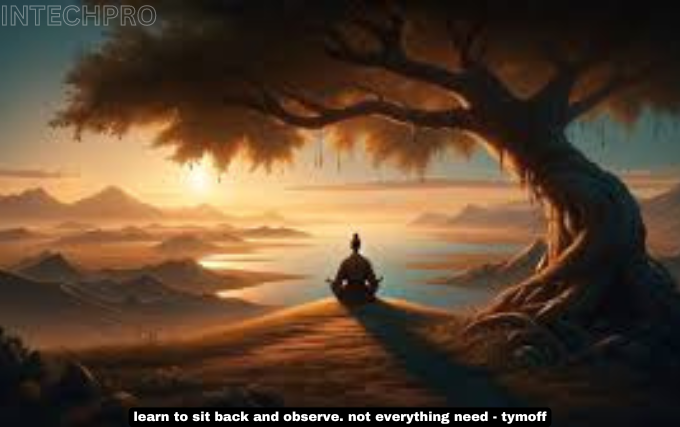In our fast-paced world, where everything seems to demand our immediate attention, taking a step back and observing can feel like a luxury we cannot afford. However, this practice is not only essential for personal well-being but also for fostering a deeper understanding of our surroundings and ourselves. In this aricle, we’ll explore the importance of learning to sit back and observe, delve into the benefits of this practice, and provide practical strategies to incorporate mindful reflection into your daily life. Get ready to embrace a transformative approach that encourages patience, awareness, and growth.
The Importance of Observation
Why Observation Matters
Observation is a powerful tool that enables us to see beyond the surface. It encourages us to:
- Understand Context: By observing our environment and the behaviors of others, we gain insight into various situations and social dynamics.
- Enhance Emotional Intelligence: Observing interactions helps us better understand emotions, both in ourselves and in others, fostering empathy and connection.
- Make Informed Decisions: By taking the time to gather information through observation, we can make more thoughtful and informed choices.
The Pitfalls of Constant Engagement
In our quest to stay connected and engaged, we often overlook the value of stepping back. The consequences of constant engagement include:
- Burnout: Continuous stimulation can lead to mental fatigue, reducing our overall effectiveness and creativity.
- Superficial Understanding: Without careful observation, our understanding of people and situations can remain shallow, leading to misunderstandings.
- Increased Stress: The pressure to always be “on” can heighten anxiety and stress levels.
The Benefits of Mindful Reflection
Mental Clarity and Focus
Taking time to sit back and observe allows our minds to declutter. The benefits include:
- Improved Concentration: Mindful observation helps sharpen our focus, allowing us to engage more deeply with tasks.
- Reduced Anxiety: Slowing down can help mitigate feelings of overwhelm and anxiety, creating a calmer mental space.
Enhanced Creativity
When we pause to observe, we create opportunities for inspiration to strike. Here’s how:
- New Perspectives: Observation opens our minds to different viewpoints, which can spark innovative ideas.
- Mindfulness in Creation: Engaging fully with our surroundings can enhance our creative processes, allowing for deeper expression in our work.
Strengthened Relationships
Taking the time to observe can greatly benefit our interpersonal relationships:
- Deeper Connections: By being present and observant, we can foster more meaningful relationships grounded in understanding.
- Conflict Resolution: Observing before reacting can lead to more thoughtful responses during conflicts, paving the way for resolution.
Strategies to Cultivate Observation
1. Practice Mindfulness
Mindfulness is the cornerstone of observation. To cultivate mindfulness:
- Set Aside Time: Dedicate a few minutes each day to sit quietly, focusing on your breath and surroundings.
- Engage Your Senses: Pay attention to what you can see, hear, smell, and feel. This sensory engagement heightens awareness.
2. Journal Your Observations
Keeping a journal can help deepen your observational skills. Consider:
- Daily Reflections: Write down your thoughts and observations from the day. This practice encourages deeper contemplation.
- Emotion Tracking: Note the emotions you observe in yourself and others, which can help enhance your emotional intelligence.
3. Embrace Nature
Nature provides a perfect backdrop for observation. To connect with the natural world:
- Take Nature Walks: Spend time in parks or nature reserves, focusing on the details around you—plants, animals, and weather.
- Engage with the Environment: Notice how your surroundings change with the seasons, and how these changes affect the mood and behavior of people around you.
4. Limit Distractions
In our technology-driven world, distractions abound. To enhance your observation skills:
- Unplug Regularly: Designate times to disconnect from technology, allowing yourself to fully engage with your environment.
- Create Quiet Spaces: Find or create spaces where you can sit in peace, free from distractions.
5. Engage in Active Listening
Observation extends beyond visual cues to the auditory realm. To enhance your listening skills:
- Focus on Conversations: During discussions, practice active listening by summarizing what you’ve heard before responding.
- Observe Non-Verbal Cues: Pay attention to body language and tone, which can convey emotions more accurately than words alone.
Conclusion
Learning to sit back and observe is a vital skill that offers numerous benefits, from enhancing mental clarity to improving relationships. In a world that often pushes us to act swiftly, cultivating the art of observation can create space for growth, understanding, and creativity. By embracing mindfulness, journaling, connecting with nature, limiting distractions, and practicing active listening, you can develop a richer, more fulfilling life. So, take a moment today to pause, reflect, and observe—the world around you is waiting to be discovered.


